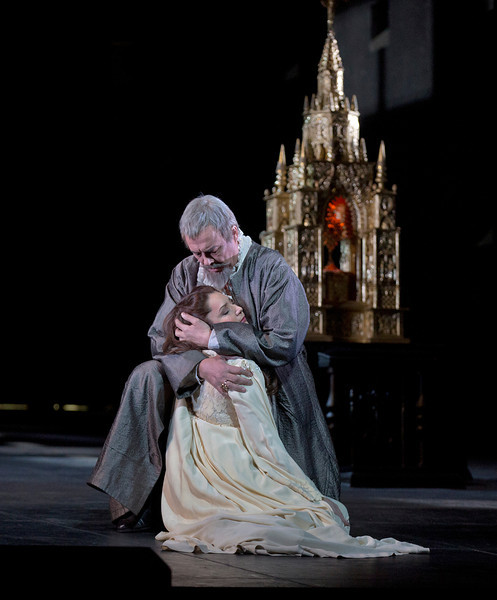 |
| Filippo (Furlanetto) mourns what might have been. Frittoli is Elisabetta. Photo (c) Met Opera |
The chorus, bless them, sang strongly, though deprived of their first ensemble and dangerously disconnected from the pit at the auto da fe. Although Anna Smirnova is not a subtle Eboli, she sounded more secure than in her first run. Her intonation was still occasionally off, and her vibrato, to me, could be distractingly wide, but she acquitted herself respectably in the challenging role. Dmitri Hvorostovsky's Posa was somewhat bland despite rich tone and elegantly spun legato lines. A cold, proud precision made this Posa a primarily political figure; little of the poignant intimacy with Carlo emerged (alas,) and I got little sense of whence Posa derived his passion. I've seen Hvorostovsky give nuanced dramatic performances while in lazily directed revivals, but this was not one of them. Ferruccio Furlanetto's Filippo was of extraordinary power and subtlety both vocally and dramatically; in the imperious, melancholy king he found a figure of tragic grandeur. He was eloquent in gesture and movement, and irresistibly compelling. Even before Filippo's great scene, his vulnerability was painfully apparent, and "Ella giammai m'amo" was spell-binding. Furlanetto's use of Italian was masterful, in clipped command as in refulgent phrases; it was from him that I received the strongest sense of what was at stake in the opera's personal relationships. Barbara Frittoli shaped her phrases elegantly as Elisabetta, and colored her tone expressively. She handled the dangerous passages of "Tu che le vanita" courageously; I'm inclined to blame the (lack of) direction for the fact that this was not as coherent or compelling as other work of Frittoli's I have seen. In the title role, Ramon Vargas sang with his customarily sensitive musicianship, and sweet, bright tone. His solid, conscientious performance was praiseworthy, and yet far from fully evoking the unstable, passion-ruled prince. Indeed, all of the principals (with the exception of Filippo, the conscience-tortured tyrant) seemed surprisingly sensible, and, to modify W.H. Auden's famous quip, opera is never at its best when its participants seem sensible.
It's all about the madness.
ReplyDeleteAt bottom, Don Carlo is your basic Italian soap opera, but bloated (or perhaps padded would be a better term) to intolerable proportions. This opera is not merely long. It's bloody interminable. Dramatically, it's a discursive train wreck, abounding with effects without cause (or without sufficient cause), and about as plausible dramatically as a Three Stooges epic...
ReplyDeleteIt bothers me no end that a master dramatic craftsman and box-office-savvy composer such as Verdi would find it acceptable to squander such splendid music on an opera whose dramaturgy was so deeply flawed.
Though it doesn't really sound, Anon, as though you're looking for debate on Don Carlo's musical structure or dramatic merits, I'll briefly give you my two cents. Long and episodic the opera undoubtedly is, but I see in the episodes which you call discursive a fierce concentration of vision, thematically speaking (perhaps even more tightly focused than that of Schiller in the play on which the opera is based.) That Verdi approaches the questions of tyranny and liberty, loyalty and betrayal, love and duty, natural and political bonds, faith and religion from such a variety of angles in this opera is, to me, one of the things that makes it so interesting.
DeleteI tend to think that what Verdi got right in this opera he got fantastically right, but for me it's the flaws that make it really interesting -- what with the various reconstructions done these days, they give us a chance to see some of Verdi's process. That he was less than satisfied with the end result is clear from the fact that there kind of isn't one.
Delete